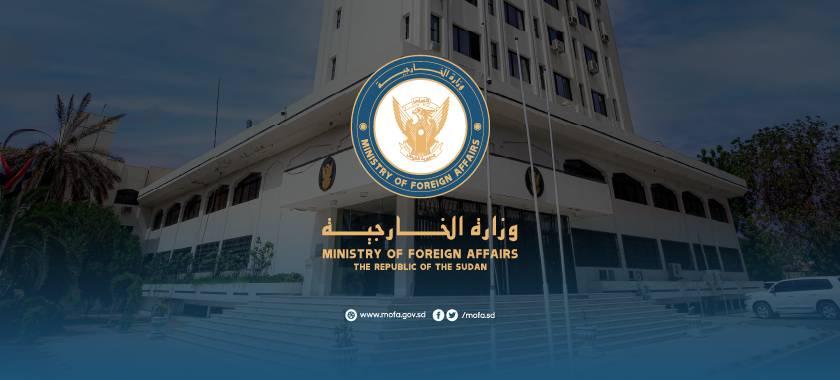Sudan govt asks int’l partners to support roadmap for dialogue

Sudan Ministry of Foreign Affairs (File photo: www.mofa.gov.sd)
The Sudanese Ministry of Foreign Affairs has called on the African Union, the United Nations, and the Arab League to support the roadmap that it says the government had put forward after extensive consultations with national and societal forces. The Chairman of Sudan’s Transitional Sovereignty Council, Commander-in-Chief of the Sudanese Armed Forces (SAF), and de facto leader of the ruling junta, Lt Gen Abdelfattah El Burhan was presented with a document entitled In the Name of the Political and Societal Forces at the conclusion of the consultations of the national and social political forces for the Sudanese-Sudanese dialogue in Port Sudan yesterday.
As previously reported by Radio Dabanga, speaking at the conclusion of the event, El Burhan, courted sharp criticism from across the political spectrum, after cautioning members of the dissolved Islamist National Congress Party (NCP)*, which ruled Sudan under the deposed Omar Al Bashir regime, as well as the pro-democracy Tagadom (Progress)** coalition, that they “will not return to power in Sudan”, and also ruled out any negotiation between the government at the Rapid Support Forces (RSF).
In its statement this morning, the Ministry of Foreign Affairs says that “the roadmap represents a national consensus to establish peace and stability in the country and complete the transition tasks”. It asserts that “the government put forward the roadmap after tightening the noose on the RSF in various theatres” and explained that the map aims to prepare for the post-war phase and resume the comprehensive political process that will culminate in holding free and fair general elections.
National dialogue and government formation
The ministry said that the roadmap includes launching a comprehensive national dialogue for all political and societal forces, and welcoming anyone who raises his hand from supporting the RSF.
The map also included the formation of a government of independent national competencies to resume the tasks of the transitional period and help the state overcome the consequences of the war.
The ministry indicated that the necessary amendments would be made to the constitutional document, approved by the national and societal forces, and then a civilian prime minister would be chosen to manage the state’s executive apparatus.
It stressed the freedom of opinion and political action “without destroying the homeland or harming national constants,” and not depriving any citizen of his right to obtain a passport.
Terms for negotiation
The map stipulates the laying down of weapons and the evacuation of civilian position for any talks with the RSF, and the non-acceptance of the call for a ceasefire unless the siege on El Fasher was lifted, and the ceasefire would be followed by withdrawal from Khartoum, West Kordofan and Darfur.
* The National Congress Party (NCP), established in 1998 by key political figures in the National Islamic Front, dominated politics in Sudan for more than 10 years. It was chaired by President Omar Al Bashir – who was ousted in April 2019, during the December 2018 Revolution. The NCP was dissolved in November 2019.
** Tagadom – The Coordination of the Civil Democratic Forces alliance, better known by its Arabic name Tagadom (meaning ‘progress’), was founded in the Ethiopian capital of Addis Ababa in October 2023, by members of the mainstream Forces for Freedom and Change (FFC-Central Council) and other Sudanese pro-democracy parties and groups. Former PM Abdalla Hamdok was elected chair. The Arab Socialist Ba’ath Party and the Communist Party of Sudan are not part of the alliance.
Tagadom aims to build the “broadest democratic civil front possible” against the war between the Sudan Armed Forces (SAF) and the paramilitary Rapid Support Forces (RSF) that erupted in April that year. In December, Tagadom invited the commanders of the warring parties to discuss its roadmap to peace with them. RSF Commander Mohamed ‘Hemedti’ Dagalo responded to the call and signed the Addis Ababa Declaration with Tagadom on January 2.
The SAF did not respond, but instead accused the alliance of siding with its enemy. In early April, the Sudanese Committee for RSF War Crimes and Violations in Port Sudan filed criminal charges against 17 Tagadom leaders (Abdalla Hamdok, Omer El Degeir, Khaled Yousef, Maryam, Zeinab, and Siddig El Sadig, El Wasig El Bereir, Rasha Awad, Maher Abujookh, Shawgi Abdelazim, Babakr Feisal, Taha I











 and then
and then